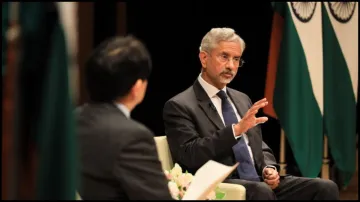Global South believes in India, China doesn't participate in meetings: Jaishankar
In the Nikkei Forum, the external affairs minister said people had the tendency to "cherry-pick principles" while defending India's relationship with Moscow. Jaishankar is currently on the second leg of his two-nation visit in Japan after his concluding his visit to South Korea.

Tokyo: External Affairs Minister S Jaishankar on Friday underscored India's leadership in the Global South, saying that 125 countries of the platform placed their trust in India while China had skipped two meetings convened by New Delhi last year to listen to their concerns. The minister asserted that the countries of the Global South "feel for each other" on several issues.
Speaking at the Nikkei Forum on the India-Japan Special Strategic Partnership, Jaishankar said, "The feeling has been intensified by COVID because many countries of the Global South felt that they were the last in the line to get the vaccine. They even felt at the time when India became G20 President that their concerns were not even on the agenda of the G20."
The minister said India hosted two meetings on the voice of the Global South which represented the collective views of the 125 countries. "They don't think it is a coincidence that it was under the Indian presidency that the African Union, which had long been promised a seat in the G20, got a seat. So the Global South believes us," he said.
Last year, when India hosted the high-level G20 Summit in New Delhi attended by global leaders like Joe Biden, Rishi Sunak and more, Chinese President Xi Jinping had skipped the summit and sent Premier Li Qiang instead. "The two summits which we convened last year to listen to their concerns, I don't believe China was present," Jaishankar said in this regard.
Jaishankar on India's relationship with Russia
Speaking about India's relationship with traditional ally Russia, the external affairs minister said people tend to "cherry-pick principles" when it suits them and ignore them when it doesn't, highlighting that Indian territory has been occupied by another country but the international community has maintained a stony silence over the matter.
"Sometimes in world politics, countries pick one issue, one situation, one principle and they highlight it because it suits them. But if one looks at the principle itself, we in India know better than almost any other country. Immediately after our independence, we experienced aggression, an effort to change our boundaries and even today parts of India are occupied by another country but we did not see the world respond saying, oh, there's a great principle involved and therefore, let us all go with India," he mentioned.
"I would say injustice was done to us. I'm not advocating it should be done to everybody else. We have been very clear. My Prime Minister has stood next to President Putin and said we want to see the end to this conflict," Jaishankar further said. The minister had previously defended India's solid ties with Russia and said Europe should not expect New Delhi to have a European perspective of Moscow.
India's importance as an Asian neighbour
Talking about India's strategic importance in Asia, Jaishankar said, "Due to the tragic conflict taking place in Ukraine, energy costs went up, food costs went up, fertiliser costs went up and a country like Sri Lanka had this huge economic crisis. If you see which countries stepped forward to help Sri Lanka, India put together a package within a matter of a few weeks, in fact, a few months which was four and a half billion dollars. Just so that you understand, the IMF packet which took much longer was less than USD 3 billion. So our direct bilateral support we gave to Sri Lanka was 50 per cent larger than what the IMF gave."
He further said India understands its obligations and takes its Global South responsibility very seriously. "We do recognise today that as a big economy, we have more responsibilities. But I also would like the world to recognise that we may be a big economy but we are still an economy whose per capita income is below $3,000. So when we give something to the world, it is done with a great deal of sacrifice and a great effort on the part of the people of India," he added.
Jaishankar on imposing sanctions on China
In response to a question about whether India would impose sanctions on China if it invaded Taiwan, Jaishankar said, "By and large, it has not been India's foreign policy method. We rarely do sanctions... The sanctions are something which is very much rooted in a Western way or I would say a G7 way of working because they control the means to apply the sanctions". He further questioned whether sanctions work and said it has nothing to do with China or Taiwan. China views Taiwan, a self-governing island, as a rebel province that must be reunified with the mainland even by force.
Talking as to how a stable government can significantly carve a country's foreign policy, Jaishankar said: "Every country, every society is different. So what can apply to India need not always be the same for other countries. But our own experience is that the lack of stability in politics affects foreign diplomacy. To have majorities in Parliament to take bold steps makes a very big difference. Here, I am certain that we have a stable government for at least a decade or even more."
(with inputs from PTI)
ALSO READ | China hasn't observed longstanding written agreements that caused 2020 bloodshed: Jaishankar in Japan